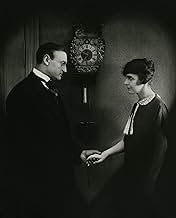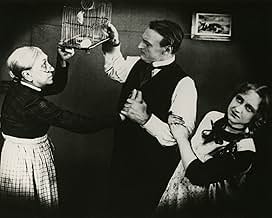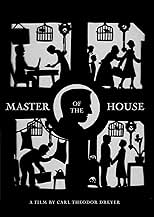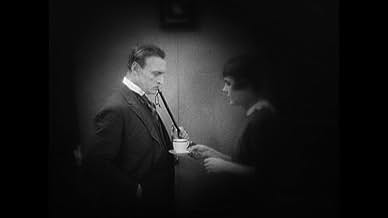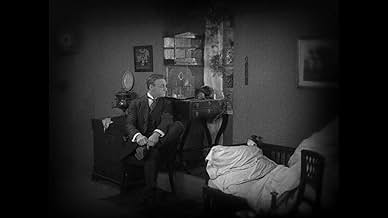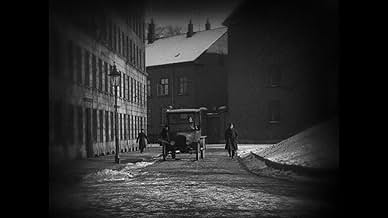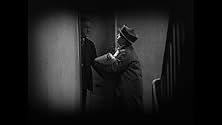IMDb-BEWERTUNG
7,0/10
2552
IHRE BEWERTUNG
Füge eine Handlung in deiner Sprache hinzuWhen a man becomes tyrannical towards his family, the women of the house decide to teach him a lesson in gratitude.When a man becomes tyrannical towards his family, the women of the house decide to teach him a lesson in gratitude.When a man becomes tyrannical towards his family, the women of the house decide to teach him a lesson in gratitude.
Empfohlene Bewertungen
"A drama," they call it, and true enough, a drama it is. But to an extent this is a film that somewhat occupies a strange place. The content defining the first 45 minutes or is strikingly dark - any basic premise of the movie refers to male figure Viktor as a "tyrant," but that alone is too kind a word to describe his monstrous behavior and cruel disposition. The tone that 'Master of the house' adopts is much too light to wholly impart the horrid abuse he inflicts upon his wife, his children, and everyone else around him, which with a mere change of technical composition would be fitting for a more modern, grittier rendition. At the same time, the described comeuppance he slowly comes to receive is indeed gratifying, and conveys much needed levity to offer counterbalance to the severity of the first act. Even as the picture ultimately ends as we anticipate, there's sufficient somber realism in the course of events that frankly a content warning is necessary in light of Viktor's iniquities and his family's victimization.
With all that said, however, there's also no mistaking that the miasma serves to build a wonderfully engrossing, compelling story. The adapted screenplay concocted between director Carl Theodor Dreyer and playwright Svend Rindom is filled with vivid, engaging scene writing, and strong characters who have real arcs. The narrative is unexpectedly rich and satisfying as it plays with timeless themes of family, responsibility, and humility. Plenty of other movies over the years have toyed with similar notions in different ways and to varying degrees of success, yet to whatever measure comparisons can be drawn, 'Master of the house' still comes off as a title all its own, with a precise, pleasing mixture of drama and lightly comedic elements. Moreover, at length it's terrifically endearing in its heartfelt sincerity, communicating important social messaging as Viktor learns what is most important.
One must note the swell contributions of everyone on hand, including those behind the scenes working in costume design, hair and makeup, and set design and decoration. Dreyer's direction - guiding the cast, arranging shots and scenes, and helming the production generally - is sturdy and capable, as is his editing. Above all, though, the cast is a delight. Johannes Meyer gives an exquisite performance as Viktor, illustrating super range and poise in embodying the man at his most cretinous, but also in his humbled state. Playing opposite Meyer with great nuance and strength of personality, Mathilde Nielsen is a blast as nanny Mads, serving as a brilliant foil and corrective force in the home. Even the young actors depicting the children, especially Karin Nellemose as oldest daughter Karen, demonstrate fine ability even at just the start of their careers, and it's a treat to watch them all practice their craft.
Between the subject matter, the overall thrust of the plot, and the film's place in the silent era. This isn't necessarily going to be for all viewers. For any subjective difficulties that may present, however, by far I dare say this is a tremendously worthy, absorbing feature that very well stands the test of time. Rather excruciating as the first bit of the length is, when all is said and done 'Master of the house' is earnest and beautiful, and rewarding as a viewer. Anyone who isn't turned off by what a mere glance may portend would do well to sit for it, and I think there's enough value here that enough those who tend to resist silent pictures may still find it worthwhile. Long story short, if you have the chance to watch 'Master of the house,' I think these are 107 minutes that hold up very well almost 100 years later!
With all that said, however, there's also no mistaking that the miasma serves to build a wonderfully engrossing, compelling story. The adapted screenplay concocted between director Carl Theodor Dreyer and playwright Svend Rindom is filled with vivid, engaging scene writing, and strong characters who have real arcs. The narrative is unexpectedly rich and satisfying as it plays with timeless themes of family, responsibility, and humility. Plenty of other movies over the years have toyed with similar notions in different ways and to varying degrees of success, yet to whatever measure comparisons can be drawn, 'Master of the house' still comes off as a title all its own, with a precise, pleasing mixture of drama and lightly comedic elements. Moreover, at length it's terrifically endearing in its heartfelt sincerity, communicating important social messaging as Viktor learns what is most important.
One must note the swell contributions of everyone on hand, including those behind the scenes working in costume design, hair and makeup, and set design and decoration. Dreyer's direction - guiding the cast, arranging shots and scenes, and helming the production generally - is sturdy and capable, as is his editing. Above all, though, the cast is a delight. Johannes Meyer gives an exquisite performance as Viktor, illustrating super range and poise in embodying the man at his most cretinous, but also in his humbled state. Playing opposite Meyer with great nuance and strength of personality, Mathilde Nielsen is a blast as nanny Mads, serving as a brilliant foil and corrective force in the home. Even the young actors depicting the children, especially Karin Nellemose as oldest daughter Karen, demonstrate fine ability even at just the start of their careers, and it's a treat to watch them all practice their craft.
Between the subject matter, the overall thrust of the plot, and the film's place in the silent era. This isn't necessarily going to be for all viewers. For any subjective difficulties that may present, however, by far I dare say this is a tremendously worthy, absorbing feature that very well stands the test of time. Rather excruciating as the first bit of the length is, when all is said and done 'Master of the house' is earnest and beautiful, and rewarding as a viewer. Anyone who isn't turned off by what a mere glance may portend would do well to sit for it, and I think there's enough value here that enough those who tend to resist silent pictures may still find it worthwhile. Long story short, if you have the chance to watch 'Master of the house,' I think these are 107 minutes that hold up very well almost 100 years later!
"We men are such fools!" proclaims former master of the house Viktor, and you can't help but feel a sliver of guilt as he silently utters those words. That's the timeless universality of film, I suppose: a Danish movie made over 80 years ago is still relevant today.
This was my first Dreyer, and it is quite a light offering considering the man's weighty reputation. It's a social drama with a patently feminist message delivered with a typically heavy hand (by today's standards). Johannes Meyer is Viktor, the decent man turned into a brute by the failure of his business who doesn't realise just how much he takes his long-suffering wife Ida (Astrid Holm) for granted. Fortunately for Ida, Viktor's curmudgeonly former nanny (Mathilde Neilsen), takes control of the situation by packing the frazzled Ida off to a sanatorium so that she can sort Viktor out.
The film drags for the first half-hour as the daily ritual of the Frandsen family is established. Let's face it, there's little of interest in watching people polishing shoes and preparing breakfast, but things get a little more interesting once Nanny takes charge. It's message is a bit too sweeping (although all us men are probably guilty to some degree) and a little too simplistic in its treatment and resolution, but there's plenty on the screen to demonstrate Dreyer's talent as a director - although some symbolism (caged birds, for example) must have been overused even by 1925. A decent enough film, worth watching despite its mundane setting.
This was my first Dreyer, and it is quite a light offering considering the man's weighty reputation. It's a social drama with a patently feminist message delivered with a typically heavy hand (by today's standards). Johannes Meyer is Viktor, the decent man turned into a brute by the failure of his business who doesn't realise just how much he takes his long-suffering wife Ida (Astrid Holm) for granted. Fortunately for Ida, Viktor's curmudgeonly former nanny (Mathilde Neilsen), takes control of the situation by packing the frazzled Ida off to a sanatorium so that she can sort Viktor out.
The film drags for the first half-hour as the daily ritual of the Frandsen family is established. Let's face it, there's little of interest in watching people polishing shoes and preparing breakfast, but things get a little more interesting once Nanny takes charge. It's message is a bit too sweeping (although all us men are probably guilty to some degree) and a little too simplistic in its treatment and resolution, but there's plenty on the screen to demonstrate Dreyer's talent as a director - although some symbolism (caged birds, for example) must have been overused even by 1925. A decent enough film, worth watching despite its mundane setting.
...that explores the deterioration of a relationship of a husband and wife in Denmark after the man has lost his business. He becomes, not only morose, but extremely nasty towards his entire family, channeling all of his own personal misery towards his wife, his mother-in-law, his children, and his former nanny.
The first half of this film will win few viewers' sympathy concerning the husband. Frankly, in most of today's world, especially in the USA, any wife would have walked long ago rather than put up with such abuse. Instead, we see a form of mores that existed in a culture of yesterday, where this particular wife still holds great affection for her husband. Carl Theodore Dreyer does a commendable job showing the breakdown of the situation into its component parts, the breakup of the relationship, not by the wife, but by the nanny and mother-in-law, and then the re-assembling of the pieces into a concordant whole again. It's beautifully done, but it's dated. The major star of the piece is Mathilde Nielsen who plays the former nanny of the husband. Her eyes alone are worth the show.
This is well worth the watch but be forewarned that this is not necessarily a very pleasant piece, and I found as much to frown as to smile about.
The first half of this film will win few viewers' sympathy concerning the husband. Frankly, in most of today's world, especially in the USA, any wife would have walked long ago rather than put up with such abuse. Instead, we see a form of mores that existed in a culture of yesterday, where this particular wife still holds great affection for her husband. Carl Theodore Dreyer does a commendable job showing the breakdown of the situation into its component parts, the breakup of the relationship, not by the wife, but by the nanny and mother-in-law, and then the re-assembling of the pieces into a concordant whole again. It's beautifully done, but it's dated. The major star of the piece is Mathilde Nielsen who plays the former nanny of the husband. Her eyes alone are worth the show.
This is well worth the watch but be forewarned that this is not necessarily a very pleasant piece, and I found as much to frown as to smile about.
Victor Frandsen is a domestic tyrant. His wife Ida has to work as a slave for him and the rest of the family. She rises early to prepare everything for the day, she toils all day long, and she is often up also in the night, doing some sewing to earn extra money for the household.
Dreyer is one of the greats in silent cinema, both in his homeland and internationally. His greatest achievement is probably "Joan of Arc" and many have appreciated "Vampyr". This film came a few years earlier, but is every bit as good in its own way (and with its release on Criterion, it has never looked better).
The Danes are not typically known for their role in cinema history, but Dreyer was an undeniable force in the 1920s If nothing else, he inspired Bergman, who was probably the greatest Scandinavian director of all time.
Dreyer is one of the greats in silent cinema, both in his homeland and internationally. His greatest achievement is probably "Joan of Arc" and many have appreciated "Vampyr". This film came a few years earlier, but is every bit as good in its own way (and with its release on Criterion, it has never looked better).
The Danes are not typically known for their role in cinema history, but Dreyer was an undeniable force in the 1920s If nothing else, he inspired Bergman, who was probably the greatest Scandinavian director of all time.
The story of a "spoilt husband" - selfish, irritable, very ill-tempered and demanding as he rules the house, while his patient/devoted wife gets up at the crack of dawn to start her drab day of tending to his constant needs and complaints. Even the kids have to perform tasks all day rather than play to satisfy their tyrant of a father - but he's NEVER satisfied, nothing seems to be to his liking! Yeah, you got it, this guy is a serious jerk leaving me to wonder why the wife hasn't left him long ago. Luckily smart Nana, hubby's childhood nursemaid, steps up to the plate to help make some changes as she fetches the wife's mother and the two old women set out to straighten this guy out and teach him the lesson he so badly needs - to appreciate his wife. So the wife goes away for a "rest" (well needed, I should say) leaving hard-nosed Nana in charge of the brute!
This film is adequately entertaining, it is photographed in an interesting way, but is somewhat slow-moving and drags a bit in places. I would say at least half an hour shorter would have made this a better film. The acting is quite well done by all players. The version as shown on TCM included a pleasant piano score that sometimes suits the plot - and sometimes doesn't. Worth seeing.
This film is adequately entertaining, it is photographed in an interesting way, but is somewhat slow-moving and drags a bit in places. I would say at least half an hour shorter would have made this a better film. The acting is quite well done by all players. The version as shown on TCM included a pleasant piano score that sometimes suits the plot - and sometimes doesn't. Worth seeing.
Wusstest du schon
- WissenswertesAt its original release in Paris, France, this film played in 57 theaters in three weeks.
- Zitate
Opening Title Card: In the numerous streets of the Big City, house follows house, and in those houses, people live in layers - like wild birds carving their nests into the rock... nest above nest...
- Alternative VersionenA 107-minute version with English intertitles and an uncredited piano score was shown on the Turner Classic Movies (TCM) channel in 2006. It had no crew credits other than the director (as Carl Dreyer) and only three cast members: Johannes Meyer (as Johs Meyer), 'Astrid Holm' and Mathilde Nielsen. The English names used were John and Mary for the husband and wife, presumably to indicate a typical family, and "Nana" for the Wetnurse. The two older children were called Kathleen and Dick.
- VerbindungenEdited into Mathilde Nielsen - Kavalkade (1941)
Top-Auswahl
Melde dich zum Bewerten an und greife auf die Watchlist für personalisierte Empfehlungen zu.
- How long is Master of the House?Powered by Alexa
Details
- Erscheinungsdatum
- Herkunftsland
- Sprache
- Auch bekannt als
- Du sollst dein Weib ehren
- Produktionsfirma
- Weitere beteiligte Unternehmen bei IMDbPro anzeigen
- Laufzeit
- 1 Std. 51 Min.(111 min)
- Sound-Mix
- Seitenverhältnis
- 1.33 : 1
Zu dieser Seite beitragen
Bearbeitung vorschlagen oder fehlenden Inhalt hinzufügen

